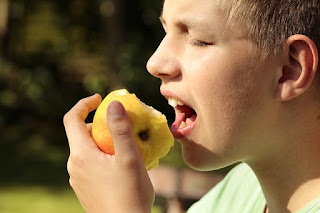Nutrition starts with the mouth
What should I eat for solid teeth and gums?
The American Dental Association
 |
| Fruits and vegetables are, among others, recommended foods at oral and dental levels. |
Every 28th of May, Nutrition Day is celebrated worldwide, an initiative supported by numerous institutions to highlight the importance of transmitting healthy eating habits; we also emphasize it in Dental Office.
All the food we eat enters through the mouth. Still, we have to pay more attention to oral health because, in addition to oral pathologies, many diseases can affect the rest of the organism, beginning in the mouth.
With the current pace of life, more and more people must eat out, so you only sometimes have a brush to wash after a meal, or sometimes what is missing is the time to do it at work. If, for whatever reason, we cannot clean our teeth, we can at least, on those occasions, try to eat foods that benefit our teeth and thus minimize damage.
What are these foods? The American Dental Association promulgates that the ideal is to eat foods rich in phosphorus and/or calcium since these minerals are indispensable for the strength of our teeth and gums. Calcium is found mainly in dairy products, such as milk, cheese, or yogurt, and phosphorus is found in protein-rich foods, such as meat, fish, or eggs.
Other recommended foods, orally speaking, are fruit and vegetables. Their high water and fiber content make them an infallible ally for cleaning teeth. "In addition, another benefit they offer is that they help produce more saliva, which neutralizes acids from bacteria and protects against cavities. Another trick that helps stimulate saliva is chewing gum, without clear sugar, after meals," says Dr. Karmalge.
Nothing replaces good brushing or flossing, but these meals are a good plan B if you don't have any of that on hand.
And on the other hand, you also have to know the foods that hurt us the most. Given this, Dr. Karmalge explains that "not all foods or drinks are equally beneficial for our oral health, while some are essential and provide us with the necessary nutrients, as well as providing us with protection, others do the opposite: they erode the enamel, leave the teeth more vulnerable to attack by bacteria, make our mouth dryer...and a wide range of other unhealthy effects".
Most Harmful Foods, According to the American Dental Association
- Hard candies: sugar is the main enemy of our oral health, so sweets are on the oral health blacklist. And these candies have an added danger because, being hard, they can splinter or break a tooth.
- Sticky foods: Some snacks such as nuts or dried fruit seem healthy, but for oral health, they may not be because they are sticky, which means they stay in the teeth more extended than the rest and cost more to remove the remains.
- Crunchy snacks, such as French fries: These are the aperitif par excellence, ideal for removing hunger between meals, but their problem is that they contain a lot of starch and remains between the teeth, thus facilitating the attack of bacteria.
- Chewing ice: although the ice is formed by water and has no additive, there is no need to chew it. In doing so, the temperature changes abruptly, causing the blood vessels and nerves that make up the dental pulp to dilate and generate a lot of pain. In addition, over time, the pulp retracts, calcifies the area, and can lose the sensitivity of the piece and, in the most extreme cases, the loss of the tooth.
- Citrus in excess: Like all fruit, it is essential for the diet and very beneficial, but care must be taken not to ingest them in excess. This fruit contains many acids, so abusing it damages the tooth enamel.
- Coffee and tea...with additives: In their neutral form, they are two very healthy drinks that benefit our oral health, but by adding sugar or other additives, they can lose those qualities and damage the health of our teeth.
- Refreshments: As with candies, excessively sweetened soft drinks increase the risk of tooth decay. To quench your thirst, there is nothing better than water or milk.
- Isotonic drinks: These are designed for sportsmen and women who have done extreme exercise and must immediately replace sugars and electrolytes, but their globalization has caused the general public, including children, to consume them. They are harmful if you are not a sportsman because they carry a high amount of sugar and acids, which causes damage to tooth enamel.
- Excess alcohol: Alcohol causes our mouth to dry out and secrete less saliva, leaving teeth and gums more vulnerable to bacterial attack. It is also a risk factor significantly increasing the likelihood of developing oral cancer.
